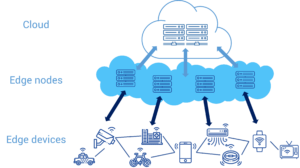Edge computing is a technology that brings computing and data storage closer to the devices and people that use them. It is a distributed computing architecture that processes data at the edge of the network, near the source of the data, rather than in a centralized data center or cloud.
Edge computing is a technology that brings computing and data storage closer to the devices and people that use them. It is a distributed computing architecture that processes data at the edge of the network, near the source of the data. Rather than in a centralized data center or cloud.

In this blog post, we will discuss the advantages and applications of edge computing.
Advantages of Edge Computing
-
Low Latency
One of the biggest advantages is low latency. In edge computing, data is processed at the edge of the network, near the source of the data. This eliminates the need to send data back and forth to a central data center or cloud, reducing the time it takes to receive a response. This is particularly important for applications that require real-time data processing. Such as gaming, virtual and augmented reality, and autonomous vehicles.
-
Improved Reliability
It also improves reliability. By processing data at the edge, the system becomes less dependent on a centralized data center or cloud. This means that even if the central system fails, the edge computing system can still operate. And ensuring that critical services and applications remain up and running.
-
Better Security
Another advantage of edge computing is improved security. By processing data at the edge, sensitive data can be kept closer to the source, reducing the risk of data breaches. Additionally, it can reduce the risk of data theft by limiting the amount of data that needs to be transmitted over the network.
-
Increased Efficiency
It can also increase efficiency by reducing the amount of data that needs to be transmitted over the network. By processing data at the edge, the system can reduce the amount of data that needs to be transmitted to a centralized data center or cloud. This reduces the amount of bandwidth required and can lower costs associated with data transmission.
Applications of Edge Computing
-
Industrial IoT
This computing is particularly useful for industrial IoT applications. In these applications, it can be used to process data from sensors and other devices in real-time, enabling organizations to make decisions and take actions based on that data. For example, in a factory, it can be used to process data from sensors on machinery. Also enabling the factory to make real-time adjustments to improve efficiency and reduce downtime.
-
Healthcare
Edge computing is also being used in healthcare to improve patient care. For example, it can be used to process data from wearable devices and other medical equipment in real time, enabling doctors to make informed decisions about patient care. Additionally, it can be used to transmit critical patient data, such as vital signs, from remote locations to hospitals. Also enabling doctors to provide remote care.
-
Retail
Edge computing is also being used in retail to improve the customer experience. For example, it can be used to process data from sensors in stores, enabling retailers to understand customer behavior and make real-time adjustments to improve the customer experience. Additionally, it can be used to transmit data from point-of-sale systems to centralized data centers. Also enabling retailers to better understand customer behavior and make informed business decisions.
-
Automotive
Edge computing is also being used in the automotive industry to improve safety and efficiency. For example, it can be used to process data from sensors in vehicles, enabling cars to make real-time adjustments to improve safety and fuel efficiency. Additionally, it can be used to transmit data from vehicles to centralized data centers. Also enabling manufacturers to better understand how vehicles are being used and make informed decisions about product design and development.
Conclusion
Edge computing is poised to play a significant role in the future of computing. Whether it is for real-time data processing in industrial IoT, improving patient care in healthcare, enhancing the customer experience in retail, or improving safety in the automotive industry, it is a technology that has the potential to transform the way we live and work.
It is important to note that it is not meant to replace centralized data centers or the cloud, but rather to complement them. The edge and the cloud will work together to provide a complete and efficient computing solution. That meets the needs of various industries and applications.
To fully realize the potential of edge computing, businesses need to consider the right edge computing solution for their specific needs. This may involve a combination of hardware, software, and services. That can be customized to meet the unique requirements of each business.
With the increasing demand for real-time data processing and the growth of the Internet of Things, it is a technology that is poised to play a critical role in the future of computing. So, it is important for businesses and organizations to understand the advantages and applications of edge computing. And how it can benefit them.
In conclusion, edge computing is a revolutionary technology that has the potential to change the way we live and work. With its low latency, improved reliability, better security, and increased efficiency, it is a technology that offers numerous benefits for a variety of industries.
BACK










